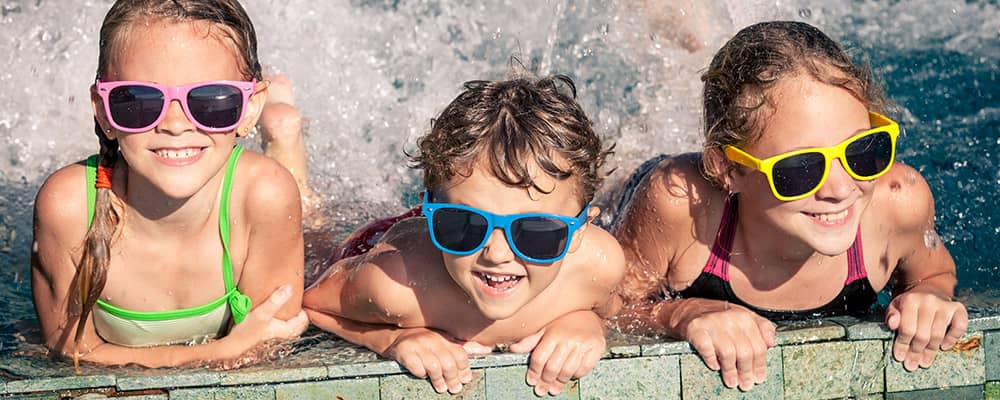Summer Safety Tips
- Britany Linton
- Home Life

Bug Safety
A disadvantage that comes with summer is the insects. Make sure you are protected from bites and stings! Don't use scented soaps, perfumes, or lotions before spending a lot of time outdoors. This will attract these pests you are trying to avoid. Try not to dress your children in bright clothing or flowery prints. Use insect repellants that contain DEET. This ingredient helps prevent insect related diseases such as Lyme disease, West Nile virus, and other viruses. If you or your child happens to get stung with a visible stinger still in you, gently back it out by scraping it with a credit card or your fingernail; the longer these stingers stay inside the body, the more severe the reaction will be. Non-allergic victims will experience redness, swelling, and pain that go away within a day or so. Allergic victims will have more severe symptoms including hives and shortness of breath. These victims, if they do not have an Epipen, should be taken to the hospital immediately.
Playground and Park Safety
Before letting your kids run wild on the local playground, you should go out there first and inspect the park a little bit. Make sure there aren't any protruding bolts or moving parts that might pinch or trap any body part. Don't ever allow your children to play barefoot on the playground; you never know what sharp objects may be hidden in that bark or what kind of germs they might be picking up. On hot summer days, remind your kids that the slides and tubes are very hot to avoid any burns. You should never leave your children unattended at the park and always supervise to make sure your children are safe.
Bicycle and Roller Sports Safety
First and most importantly, make sure your child is wearing a helmet no matter how short or far away from home they are; many serious injuries happen on sidewalks and driveways. It's recommended that adults wear helmets as well to avoid injury and set an example. When purchasing a helmet look for the CPSC safety standard sticker. Do not push your child to ride a 2-wheeler before they are ready and make sure they know how to use the brakes properly. Make sure your children aren't riding or skating anywhere alone or near moving traffic. Children under the age of 8 should be supervised at all times.
Lawnmower Safety
I know you want to keep that lawn looking nice this summer but make sure the mower is in the right hands. Make sure you are wearing sturdy shoes and walk the lawn before mowing begins. This way you can pick up any stones, toys, or objects that could potentially fly and hit someone. Always turn off your mower and wait for the blades to stop completely before you drive it off the lawn. Never allow your children to ride as passengers on the mower and make sure they are out of the yard during mowing. Protective eye wear is recommended at all times.
Pool and Water Safety
A huge concern every summer is children drowning. Parents should never let their children swim alone. Drowning occurs very quickly and silently and can be easily avoided if an adult is watching closely. It's easy to get distracted by other people, your cell phone, or even a book, so when you are at the pool with kids pay attention. When watching infants, toddlers, or weak swimmers, it is recommended that you are within an arm's reach away to avoid any accidents. Also, remind your kids that it's not safe to run around the pool because the ground tends to be very slippery. It's also never okay to dive into water less than 9 feet deep, the result could be head trauma or scrapes and cuts. If you are in open water, it's recommended that all individuals wear a life jacket, particularly children.
BBQ and Fire Safety
Throw another shrimp on the Barbie, as long as it's at least 10 feet away from other objects, including the house and bushes. Keep children away from the grill! Most fires are started by children when they are left unattended. NEVER use the grill inside a home or garage. Fireworks are also a leading cause of fires and burns during the summer. Even an innocent sparkler can reach temperatures above 1500 degrees Fahrenheit, so never leave children unsupervised with any kind of fireworks.
Sun and Heat Safety
Be aware that the sun is strongest between 10am to 2pm. Limit the amount of time spent outside during these hours to avoid getting sun burnt. Two or more sunburns before the age of 18 doubles one's risk of later developing melanoma. Sunscreen is your best friend. Reapply every 2 hours and after sweating or swimming. Remember you can never put on too much sunscreen! When spending all this time outside, make sure you are hydrating, and I don't mean with alcoholic beverages. Focus on replacing lost salt and minerals with water and sports beverages. Limit intense activity on really hot and humid days to avoid heatstroke. You should be able to recognize the signs of heatstroke and exhaustion: fatigue, confusion, extreme thirst, dizziness, and nausea. Infants, young children, those who are 65 years or older, and people who are overweight are at high risk for heatstroke and exhaustion. And remember to NEVER leave children or animals in the car.
Here are more safety tips from the American Academy of Pediatrics.
